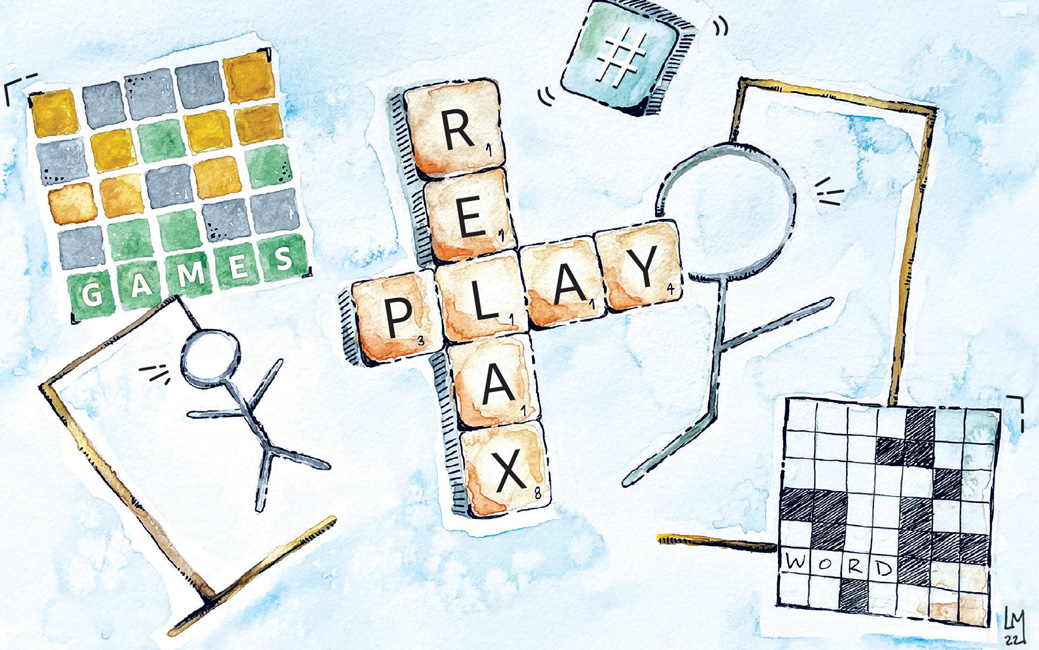Office Hours: Word Games
Chris Cain, chair of the Department of English, explains why they endure.

Word games like Scrabble and Bananagrams and language activities like Hangman hold linguistic interest for me. I think word games are attractive because they engage two fundamental primitive instincts that people have. One is play; the other is manipulating language.
Language and word games take two forms: encryption and decryption. That two-way street is essentially the thoroughfare on which people seem to be most interested in language play.
Spoken language games tend to be about encryption, because it's about play, and sometimes it serves an in-group with the level of secrecy.
English cant is an example. It was a sort of secret language that started in the late 17th century in central London and was used primarily by pickpockets to facilitate their activities. It was about keeping secrets and in-group identification.
Language games have rules. In Pig Latin, you take the onset (the first consonant) of the first syllable, you move it to the end and then you add A. But word games seem to be about decryption. Scrabble is essentially a decryptional game. So is Wordle.
Wordle is interesting because you can only access it once a day, so it also creates stakes. If you don’t decrypt the word, you wait until the next day to play again. Engagement with play, engagement with language and these once-a-day, elevated stakes have made Wordle successful. It has an in-group element as well, with people capturing their squares and sharing them on social media.
When someone plays a game like Wordle, they use strategy, even if they don’t realize it. One of the main ones is syllable structure. In the English language, you can, for example, have RH as an onset. But not HR.
The game may start with a guess: “Let me try to get as many vowels in a single word as possible to increase the chances that the next row is going to tell me where letters should go.” Players go on from there, using their implicit knowledge of English to place letters correctly.
People have an intuitive sense of that without thinking about it. And word games, to some extent, make these things explicit, just like taking a course on the structure of English makes explicit what English speakers already know.
“ So Wordle is not really just a guessing game. It engages some deep intuitions that speakers use to compute English. ”
I teach a class called The Structure of the Language. On the first day I'll say, “If you're a native speaker of English, you're an expert on English. If you're a native speaker of Farsi, you're an expert on Farsi. You already know everything we're going to talk about in this class.”
“Drink” has been a Wordle solution. English speakers already know that in a one-syllable word there are constraints on the sequence—you can’t have rdink or drikn or drkin or most other arrangements. The spelling matches constraints on syllable formation in which the onset consonants (d and r) have to be progressively more sonorous—or louder—until the vowel.
So then the coda (final) consonants (n and k) have to be progressively less sonorous. R is more sonorous than d; n is more sonorous than k. So Wordle is not really just a guessing game. It engages some deep intuitions that speakers use to compute English.
If the Wordle square were seven or eight across, that would be really, really tough because then you're getting into this territory that English explores that lots of languages don't: lots of onset consonants and lots of coda consonants.
Depending on the word game, a player’s outside knowledge or vocabulary can be a benefit. When you play Scrabble, it’s an advantage to have an expansive lexicon. That's not the only thing that matters, but obviously it helps. In crossword puzzles, you have a series of clues, and sometimes those clues are things that don't necessarily engage one’s vocabulary but one’s knowledge of movie titles, authors or actors. It’s not all about word power in the traditional sense, but word power plus cultural knowledge plus a native speaker’s linguistic intuitions.
If you speak the language, you’re an expert on that language, and so you can do language games. My advice to new word game players is to start small. Try something like Wordle first because it’s not going to take up a ton of your time. If it’s not your thing, then forget it. And if it becomes your thing, then there’s no bottom to what you can do with it.




